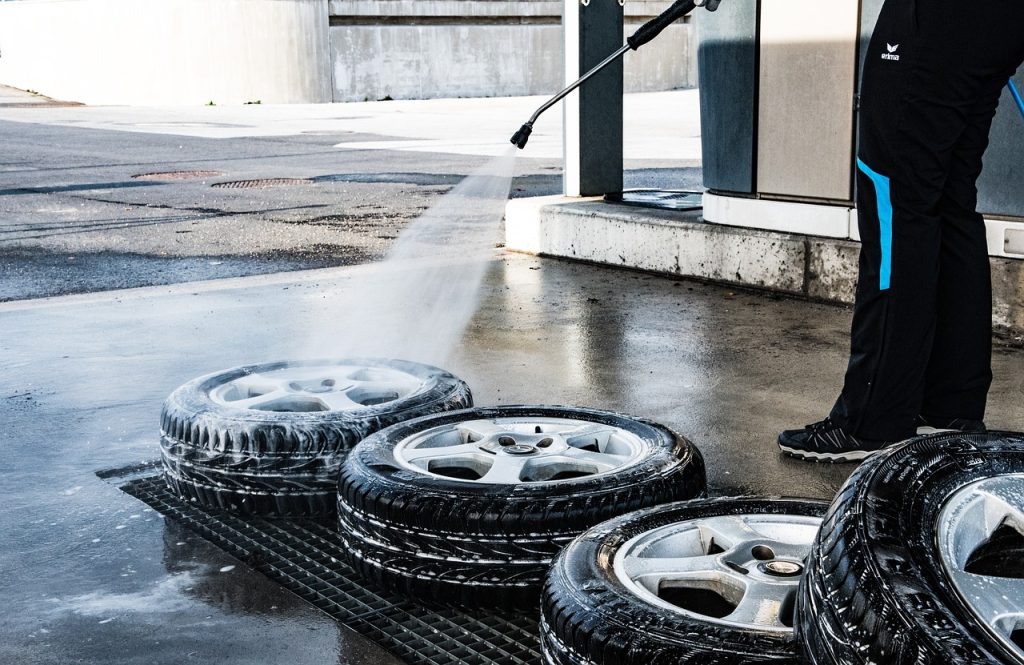Here at Kleentek, we offer cleaning solutions for multiple industries, including aerospace, engineering, automotive, medical and veterinary, industrial, mining and more. While we specialise in machine design, and the manufacturing and servicing of ultrasonic cleaning products we also produce our own range of cleaning solutions and chemicals that work for both commercial and industrial cleaning purposes.

Our range of pressure washing solutions and chemicals are suitable and effective in an array of situations.
What is Pressure Washing?
Pressure washing harnesses the force of high-pressure water, delivered through a range of specialised nozzles, to achieve optimal results. Each nozzle boasts a unique spray pattern and coverage area, allowing users to tailor the cleaning process to specific surfaces and tasks. With the right nozzle and appropriate water pressure, you can effortlessly transform the cleanliness of various surfaces across a range of applications.
- Residential and Home Cleaning: Pressure washing is one of the most effective outdoor cleaners; it can be used to clean exterior surfaces of houses, including siding, roofs, driveways, patios, and decks.
- Commercial and Industrial Cleaning: It is commonly employed for cleaning commercial buildings, parking lots, warehouses, factories, and equipment.
- Vehicle Cleaning: Pressure washing is effective in cleaning cars, trucks, boats, and other vehicles, removing dirt, mud, and road grime.
- Construction Site Cleanup: Pressure washing with the addition of can help remove construction debris, mud, and sediment from construction sites, promoting cleanliness and preventing sediment runoff into storm drains.
Kleentek Pressure Washing Chemicals
To elevate the cleaning experience of pressure washing, Kleentek formulated a range of pressure washing chemical solutions to work quickly and effectively. When combined with high-pressure washing equipment, these powerful pressure washing chemicals and cleaning solutions reduce cleaning time and deliver a professional-grade finish.
Wildflower Disinfectant: A powerful commercial-grade disinfectant that neutralises odours and eliminates harmful bacteria like Staphylococcus Aureus. It is safe to use on all surfaces and contains no harmful acids or alkalis. With its pleasant fragrance, Wildflower provides long-lasting freshness, and has been independently tested and certified as a commercial option C disinfectant.
Bin Guard: A specially formulated non-caustic detergent designed for high-pressure wash processes. It offers excellent performance and a low-risk profile in terms of Occupational Health and Safety. The balanced blend of low-foaming cleansers, non-caustic alkalis, and water softening agents effectively removes stubborn soils and is classified as non-hazardous and non-dangerous for transport. Bin Guard can be used as a cleaner and sanitizer, even with incidental contact with food, adhering to food safety standards.
Rinse Aid: For faster and cleaner drying of various items such as glassware, plastics, metal, and timber, Rinse Aid is the perfect solution. Rinse Aid reduces spotting on silver and stainless steel and helps control foaming. It is particularly beneficial for achieving flawless finishes on high-sheen items like jewellery and tableware. Specifically designed for use in rinse tanks of ultrasonic cleaning machines, it’s also recommended for use with external rinse tubs.
Pressure Washing Advantages and Disadvantages
Advantages of Pressure Washing:
- Effective: Pressure washing is highly efficient in removing tough stains, dirt, and debris from surfaces.
- Saves Time: Pressure washing can save a significant amount of time and effort for large areas compared to manual and traditional methods. .
- Versatile: Pressure washing can be applied to various surfaces, including concrete, wood, metal, vinyl, brick, and more. It can be used for outside cleaning; exterior walls, driveways, sidewalks, decks, fences, and even vehicles.
- Enhances Curb Appeal: By removing dirt, stains, and discoloration, pressure washing with outdoor cleaners can restore the original look of buildings, driveways, and other structures.
- Preventive Maintenance: Regular pressure washing can help prevent the buildup of mould, mildew, algae, and other contaminants, which can cause deterioration and damage over time, extending lifespan and reducing the need for repairs.
Disadvantages of Pressure Washing:
- Potential Damage: The high-pressure water is powerful, so care needs to be taken and some surfaces such as delicate woods and paints require adjustment to pressure and nozzles.
- Safety: Care should be taken to avoid accidents and injury. Protective gear, proper training, and adherence to safety guidelines are recommended.
Environmental and Safety Considerations
Pressure cleaning requires careful consideration of environmental and safety factors. Improper practices can lead to water contamination from pressure washing chemicals and detergents, so it is crucial to prevent contaminants from entering storm drains or natural water bodies.
Wastewater generated during pressure washing, especially when combined with pressure washing chemicals should be collected and disposed of in compliance with local regulations, to avoid harming aquatic life and water contamination.
Managing water consumption and wearing appropriate protective gear are essential for personal safety. By prioritising these considerations, pressure cleaning can be conducted responsibly and safely.
In summary, pressure washing is a powerful cleaning method with various advantages and disadvantages. It is important to consider the surface being cleaned, adjust the pressure accordingly, and follow environmental and safety guidelines to ensure effective and responsible use of pressure washing techniques.